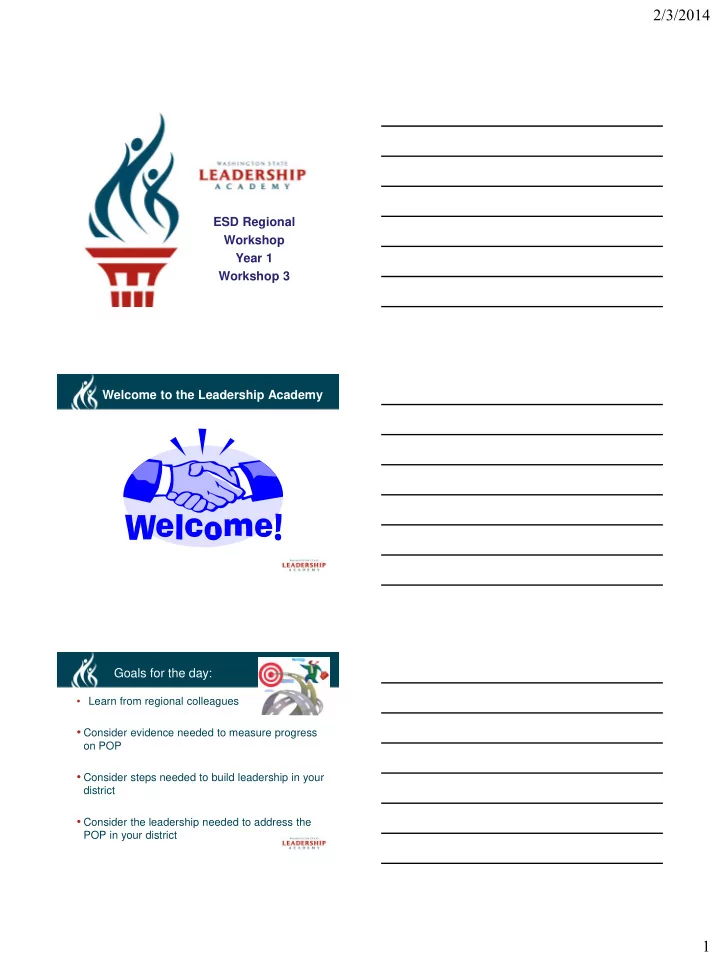

2/3/2014 ESD Regional Workshop Year 1 Workshop 3 Welcome to the Leadership Academy Goals for the day: • Learn from regional colleagues • Consider evidence needed to measure progress on POP • Consider steps needed to build leadership in your district • Consider the leadership needed to address the POP in your district 1
2/3/2014 Norms • Please help us start and end on time • Please respect the views of others • Please focus on what is happening here today • Please silence cell phones • Please close email: open during breaks only • Please avoid side conversations • Please maintain a cordial and collaborative tone WS Leadership Academy How Does the Leadership Academy Expect to Support and Develop Effective Leaders? • WSLA curriculum reflects a commitment to connecting KNOWLEDGE TO PRACTICE. • WSLA views leadership for learning as a collaborative, systemic model of knowledge, skills, and behaviors. • WSLA workshops are designed to provide new knowledge and skills, to reflect on practice, and to initiate plans. • WSLA has developed a list of the Academy Critical Content, Expected Outcomes, expected Leadership Behaviors, and expected Coaching Support. WSLA Curriculum Strands 2
2/3/2014 The Cycle of Inquiry Understand Start with a What Problem of Happened Practice Develop a Systems- Take Action level Plan & Theory of Action Identify Evidence of Progress Journal REFLECTION What steps am I currently taking and/or will take to use the information learned at WSLA Workshops to improve my own practice? Thinking About Theory of Action • Look at your team’s Two -Year Outcomes and Rubrics data sheets from the last workshop • Follow the protocol on page 4 of your Participants Handout Packet BE SURE TO RECORD ALL THOUGHTS FROM MEMBERS OF YOUR TEAM 3
2/3/2014 BREAK Evidence of Progress Evidence of Progress What does success look like? Consider “ interim evidence ” -- We ’ re on our way! AND Consider “ ultimate evidence-- Problem solved! 4
2/3/2014 Theory of Action--Review Theory of Action: • “An articulated rationale for WHY a particular set of actions or strategies are likely to lead to the outcomes you seek” • Can be rooted in: • Research • Examples of good practice • Evidence you collect about your own practice • Intuition (but be careful about this….) TEAM TIME What needs to be changed/added to your Theory of Action? What interim evidence will you collect? When? When and how will you analyze if you need a mid-course correction? What ultimate evidence will show the progress you expect? 5
2/3/2014 Protocol for District Team Sharing Use your coach to keep time and to ensure that each team gets an opportunity to present their work and to receive feedback. Process for each district: • 10 Minutes: Team 1 shares the team Problem of Practice and the developing Theory of Action for how to address the POP; • 5 Minutes: Team 2 discusses the presentation among themselves while Team 1 team listens and makes notes; • 5 Minutes Team 1 team discusses the feedback/discussion; • 5 Minutes: Teams 1 and 2 talk about how to move the work forward; Repeat with Team 2. BREAK Team Time • Examine the Regional POP and your District’s TOA • Consider: • Interim and ultimate evidence • Feedback you received today 6
2/3/2014 Problem of Practice OUR REGIONAL PROBLEM OF PRACTICE How can we create and lead a system that ensures effective instruction for all students; integrates multiple initiatives; i.e., Common Core, TPEP, Smarter Balanced … and results in sustained high levels of learning? 7
Recommend
More recommend